Text
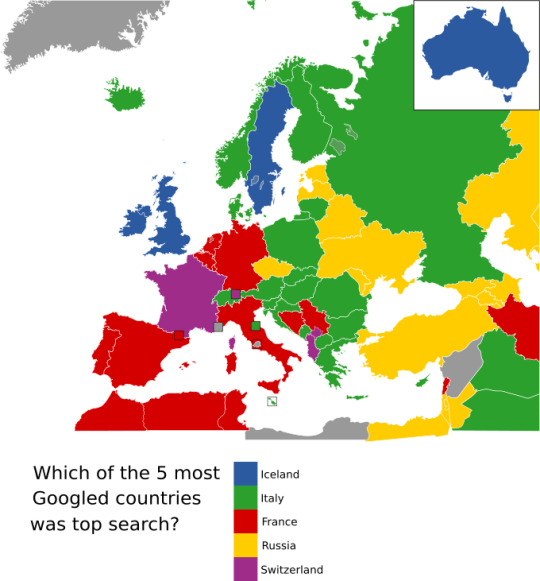
Good evening folks, and welcome to today's Eurovision statistical map - our first look at Google Trends after the final! Out of curiosity, I found the five most searched acts in the televoters' top 10 (when discounting searches of the acts in their home countries) and found which act was the most searched in the 24 hours leading up to the close of voting! I chose this interval because, soon after the voting, the balance went decisively towards the victors, Måneskin - this gives a snapshot of where the internet was at before the results!
The five most searched were four of the overall top 5 plus Manizha of Russia. Daði Freyr and Gjon's tears were top in the fewest countries, managing just four each - Gjon in nearby Liechtenstein, France, and in Albania and Kosovo, certainly in part in the latter two because of his heritage; Daði in Sweden and three primarily anglophone countries, Ireland, the UK and Australia.
The other three representatives have a greater share of territories. Barbara Pravi was the most searched in the bulk of western Europe, as well as two countries in the Balkans (Serbia and BiH), three countries in the Maghreb (Morocco, Tunisia, Algeria), Iran and Lebanon. Manizha was most searched in 10 countries of the former USSR (the only country thence that didn't search her most was Lithuania), Turkey, Egypt, Jordan and Czechia. Perhaps previsaging their win, Måneskin had the most diverse wedge of countries googling them most - almost all the Balkans, all but Sweden amongst the Nordics, half a dozen countries in Central Europe, Russia, Cyprus, Malta, Iraq and Saudi Arabia.
Måneskin are now viral across the world, and it makes me wonder if another of the most googled could have managed this feat too or not. Either way, I am delighted to see winners of our beloved contest getting such a high profile!
32 notes
·
View notes
Text
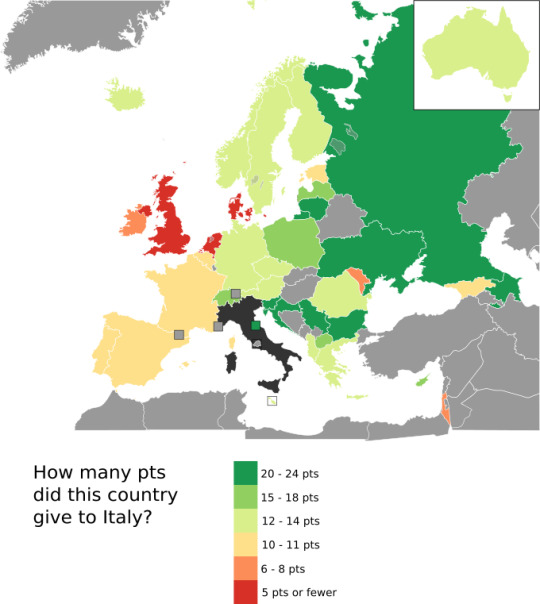
Good afternoon folks, and welcome to today's Eurovision statistical map, which is looking at how Europe's combined juries and televoters responded to Måneskin and how many pts they awarded to Italy this year!
Måneskin did incredibly with the televote, being in the top ten in every single country - and top 3 in two thirds of all participating countries' televotes! They were blanked, however, by just over a quarter of all juries - and it is primarily the juries that made countries dip in this chart. Of the ten countries who gave Italy the fewest points, 8 of them (of which also the entire bottom 7) had juries who blanked Italy.
Curiously, two of Italy's biggest rivals a priori - Malta and France - put Italy on 11°, just one spot outside of getting points. With the French jury also not having awarded Switzerland - nor, in JESC, the most direct rival a priori in Spain - it certainly raises my eyebrow.
What I find intriguing is how the countries who didn't go wild for Måneskin are mostly clustered in the west, whilst almost all the former USSR (except Estonia and Azerbaijan), Central Europe and the Balkans awarded Måneskin with above average scores. With the exception of Denmark, Italy really outperformed how it has often done with Nordic countries, too!
241 notes
·
View notes
Text
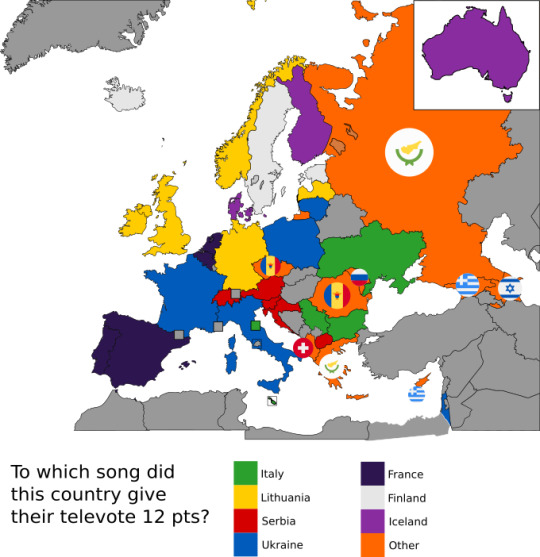
Good afternoon folks, and welcome to the first Eurovision statistical map of ours to be made in the wake of some crazily eventful results last night! The first thing we wanted to look at was how the people voted and where the televote's top 12s were destined!
In total, 13 countries received at least one douze - three less than in the jury vote - and four countries hoovered up more than half of the countries' available maximum points: no small wonder at the number of nul points in this very top-heavy year. The quartet with the most douzes are Italy, Lithuania, Serbia and Ukraine with five each; France on 4 and the Nordic duo of Finland and Iceland on three a piece complete took all but 9 douzes last night!
It's quite interesting to see geographic and cultural patterns informing these top points. Lithuania's five biggest benefactors are all in northern Europe, relatively close to each other along the North and Baltic seas. Ireland, the UK and Norway all have sizeable Lithuanian émigré populations and have given their televote top to LT in the grand final on every possible occasion since 2016.
Serbia's five douze-awarding countries are even more tightly concentrated geographically. With the exception of Macedonia, they form a contiguous group spanning from Switzerland to Croatia. This was a relatively predictable set of backers - the three ex-YU countries that could vote for Serbia and two countries with sizeable ex-YU diaspora. France's was also pretty predictable - its two fellow Romance-speaking nations to its south-west, its neighbour Belgium and their neighbour the Netherlands. The Nordics dividing almost equally between Iceland and Finland was something I foresaw too - the more heterodox groupings were those behind Italy (predictably, San Marino and Malta and less predictably, two Balkan nations and Ukraine) and Ukraine (two big 5, two eastern countries and Israel).
Of the nine countries who didn't give points to one of the major 12-getters, curiously, most of these are countries in south-eastern Europe or the former USSR. Moldova 12'd Russia and Greece and Cyprus maintained their tradition of douzing each other, and were joined by one other country each (Russia for Cyprus, Georgia for Greece). Two countries, Romania and Czechia, intriguingly gave their top votes to Moldova. Azerbaijan gave 12 to Israel, with which the country has strong ties. Albania gave their 12 to Switzerland - the only televote top that Gjon got - undoubtedly inspired somewhat by his roots in their country.
55 notes
·
View notes
Text

Perfectly tied douzes for Switzerland and France... this televote is going to be such a wild ride!
39 notes
·
View notes
Text
One of the best things about this year's ESC?
For me, it has to be the interviews and hosting of Nikkie. One of the most authentic and natural people who's been involved in the presenting side for ages. I wish we could see her doing her interviews in future years, regardless of where the contests are held!
57 notes
·
View notes
Text
Stop the host entry curse
If you can spare a vote for Netherlands, please do.
Jeangu is an incredible artist who's brought two songs full of lyricism and meaning. For me, this is one of the most powerful songs of the year. He doesn't deserve to flop!
31 notes
·
View notes
Text
Albania deserved better than the death slot twice
A third year (2018, 2019, 2021) of bringing authenticity, national language, local musical culture, absolute PIPES... I'm so glad Anxhela is in the final and I hope she can outperform the slot she's been put in.
25 notes
·
View notes
Text

Good afternoon folks, and welcome to today's Eurovision statistical map! I had planned to release multiple maps today but I'm laid low with illness and really bad news - but I couldn't miss out on a tradition that I've kept since beginning this blog back in 2012, releasing the annual map of this year's lyrical content on the day of the contest! I base this map upon primarily what the singers themselves say about their songs. Sometimes, it's hard to fit a song to a general category, and on other occasions, a song fits several, so I pick whichever I feel fits best.
The most typical topic for Eurovision lyrics tends to be about personal relationships - but this year, we have rather less than usual, especially about positive ones. And so many of the positive ones in their own right are layered with darkness: Spain's tender love song is coloured by the bereavement during which Blas wrote the song, Greece's lyrics abound with references to shadows and dark, and is in a minor key; Switzerland's has a positive resolution but is musically sombre and with many dark lyrical motifs. Of this section, the only ambiguously upbeat positive relation songs for me are those of the UK and especially Iceland.
It's rare for negative relationship songs to outnumber positive ones, but this year, that has indeed happened - maybe it's a side effect of the pandemic? Austria, Estonia, Croatia and Israel all talk about the end of a relationship, whilst Belgium has a wry look at a bad one night stand, and Albania's Anxhela can't forgive herself for past deeds. In the place of the positive relationship songs, we have a bumper surfeit of songs that I'd categorise as being more about pure passion - with many, like Denmark, Serbia and Cyprus, seeming to take place on the dance floor - again, maybe influenced by pandemic cravings!
I expected that this year would have quite a few songs that were motivational or about overcoming difficulties - and we clock in with an impressive 10. Some of these songs are more self-motivational than anything, like France's call for acceptance of herself, or Ireland's quest to rise up against inner demons and find oneself. Others aim to motivate others - Czechia's Benny said he literally wanted to just make people smile, whilst Slovenia encourages one to find inner strength and Romania preaches the importance of not forgetting to love oneself.
Like 2020, 2021 is a year with many songs with a political, social or existential message. This year, we have not just one but several feminist anthems - Russia, Malta, Latvia - which all overlap heavily with the motivational category. Elsewhere, Germany takes a stand against toxicity, Italy is a defiant defence of outsiderdom, and the hosts, Netherlands, sing a beautifully poetic song inspired by BLM encouraging people to find their roots and stand up for themselves.
We only get a few songs this year that I would primarily consider saudadic or melancholy about loss or nostalgia primarily - maybe most countries steered clear because this past year has provided a surfeit of that already. Portugal features a sex worker they met looking back on broken dreams, Norway at an unrequited love and Bulgaria at the passing of time.
The biggest lyrical outlier for me this year is Ukraine, who have taken their inspiration from traditional spring songs envoking nature and the change of season. Maybe it's just me, but I also see an underlying symbolic optimism about our current situation in these lyrics; awakening the spring to go outside and love one another.
Good luck to all your favourites tonight and enjoy. May we never ever go without Eurovision for more than a year again!
119 notes
·
View notes
Text

Good evening, folks - have you ever wondered what Eurovision's results might look like, if the participating artists themselves were the ones who had the say over the winner? There are festivals like that, and it led me to always wonder this. This year, thanks to Nikkie's Looklab interviews, we have something of an answer - at least for 2021.
Towards the end of her chats with artists, she asks them to whom they'd give their twelve points - and we have answers from all of them, except Tornike (whose interview is MIA or non-existent) and Destiny (who took pains to not say). I tallied up their answers to see who would win a notional 'artists' poll'! In the case where the artist is a group and they don't agree, I divided their 12 between their favourites. When a single artist, like Victoria, chose more than one favourite without specifying her top fave, I also divided her 12 amongst these songs.
The result is not so surprising - at least not the top 6, songs with a lot of good will in the fandom and pretty good bookies' response too. Iceland's Daði & Gagnamagnið definitely have a lot of fans and good will, topping the poll; Switzerland, France, Italy, Russia and Malta completing the poll!
51 notes
·
View notes
Text

Good afternoon, folks! With the dust settling over which countries made it through to the grand final after two years waiting for results, and which did not, I thought I'd take a wee look at how 2021's results are in line with historic trends for each country. Here are a few of my takeaways from that!
Untouchables strengthen their grip: there are 6 countries now who have a qualification streak of 4 or more years. Ukraine is the only country never to NQ, and Sweden may never NQ again after their one time Bergendahl-shaped blip in 2010. These streaks are well known, but I find more curious the southeastern trio of powerhouses: Bulgaria seems to have one of the most ambitious delegations and Cyprus has one that found a niche that seems to secure qualification every year. I am really surprised that Israel, who not long ago found it hard to break into the final and had four years in the wilderness. I would have bet money that this was the end of their 2015-19 streak. Norway also surprised me somewhat, as I felt juries were likely to have tanked Tix.
Time in the desert: An unfortunate trend for me is the way that the two countries with the longest NQ streaks are Georgia and Latvia, both of whom have waited since their last appearance in 2016 to return to Saturday. Since then, both countries have offered up such diversity - rave electro, sultry torch song, gentle Americana and chaotic energy from Latvia; a big ballad, ethno-jazz, drama, rock and ambiental from Georgia - and gotten paid dust each time. I'd like to see both in the final much more often for always dancing to the beat of their own drummers.
Rebounding powers and new potential strongholds: Russia and Azerbaijan, who so often share points amongst each other, also shared disappointment in 2018 with long qualification streaks coming to an end. That seems more of a blip than anything else now. Also from the 2018 class of NQs, Malta, Switzerland and Greece have also strung two quals together and seem to have a renewed vision and competitivity. I'd be surprised if almost all these countries don't make it a hat-trick in 2022 based on current form.
Ends of era and new hopes?: Five countries managed to qualify in 2021 that did not in 2019. Portugal have really been through it all: four NQs, a fallow year, a win, last place in the final and an NQ that shocked a lot of the fandom. All they'll need is to get 25th or better to get their second best result of the past ten years - one wonders if they can build a streak after this. Belgium reëmerges after two years of misses in the shadow of huge success with Blanche and Loïc. Moldova bounce back after a 2019 NQ, and whilst I doubt they replicated their 2017-8 success, they'll be hoping to build on this next year. Finland and Lithuania have had their host of NQs in recent years, but both their NF formats seem revitalised - maybe they can build streaks.
Making room for them is Denmark after a three year run in the sun, Estonia whose qualification form has been unpredictable this past decade, Slovenia who had defied odds twice with unconventional songs in their native language, Czechia whose purple patch has come to an abrupt end, Macedonia who will surely fear that Proud was a blip and that they may return to their long line of NQs, and Australia - unable to perform in the studio, already handicapped somewhat in the odds by probably their most daring and unconventional entries so far, finally breaking an impressive 5 year qualification streak.
A tale of two Balkans: It really is the best of times and the worst of times on the Balkan peninsula. Former qualification lock Romania hasn't been in the final since 2017, nor too has Croatia - I do wonder if another Damir song would have stood out more and ended their spate of bad luck. Slovenia and Macedonia bow out and may be fearing the beginning of another NQ streak. Meanwhile, not just Bulgaria but also Albania and Serbia are in fine form. with 3 qualifications in a row, singing in their national languages each time and with songs embued in local musical culture. Notably, both their most recent NQs were singing in English and, in Serbia's case, with a song with little hint of traditional sounds. Perhaps they both have found a niche at the contest that some neighbours have not.
30 notes
·
View notes
Text

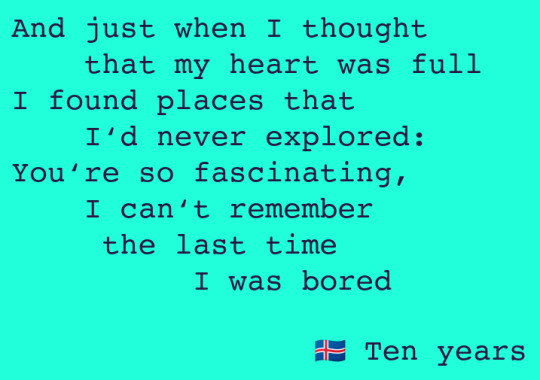

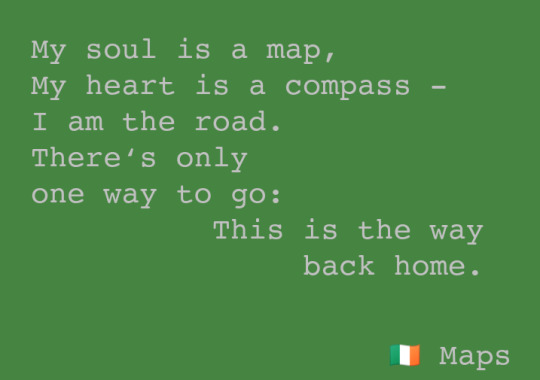


Hey there folks! Every Eurovision year now, I've highlighted a few songs whose lyrical content I find particularly noteworthy, and 2021 will be no exception - here's what I think are six of the best songs lyrically this year (and my favourite lyrics from them!)
Birth of a new age - Quite frankly, Jeangu is one of the most incredible lyricists I can recall in recent years, and he's spun gold two years in a row. I'll really miss him as the Dutch representative and hope he can return in a 'normal' year some day. I honestly could have picked any part of this song's lyrics to highlight as they are all so evocative and powerful. Other than the one I highlighted in the image, I absolutely adore the use of the adage mi na afu sensi and its symbolism - I'm like a half cent, small but unable to be broken.
Ten years - People often focus on Daði's groovy musical style, but I'd love to see more appreciation for his lyrical work too. In all three of his SVK/ESC songs, there's a simplicity, understatedness and sincerity. He captures the essence of a good relationship being like a journey in which one constantly is exploring and discovering beautifully.
Amen (Slovenia) - People often unfairly shut down on a song because it has 'religious' imagery, but Ana Soklič said that this is more a song about resilience and personal strength than anything else, and I truly feel that. The language is unadorned but so powerful for me.
Maps - I love the central motif of maps and directions and how it works metaphorically to talk about refinding one's home and place in the world. The part of the lyrics I've highlighted is such an anthemic moment for me.
Russian woman - Such a delight for the return of the beautiful and expressive Russian language. The broken family part I highlighted always hits me really hard, but I could have picked a dozen other lines to highlight. I love the dialogue of stupid things she hears, the "а себя я чертовски люблю", and the emotional power of "you're strong enough, don't be afraid." In a just world, this would be a contender for the win for me.
GUIGO - From the first line with its brilliant imagery of "playing tetris with my feelings, trying to keep them all inside", Victoria's song this year is such a lyrical treat. I love the way that ideas are constantly built upon - the tetris image complimented with the ocean of emotion that one struggles to contain, and then the water imagery being added on with the idea of treading the waters of time. For me, the most powerful moment is the outro though. Simple but heart-piercing.
76 notes
·
View notes
Text

Hi there, folks! We finally have the running order for this year's Eurovision - I've been waiting so long to get my hands on one of these! I of course had to take a look at starting positions to try to gain some insight into how countries may have done in the semi-finals, using both what the juxtapositions made suggest to me, and how previously songs did in those positions.
The evening will kick off with Cyprus and close with San Marino. The opening and curtain-closing positions have a lot of commonalities in this producer-created running order era - they tend to pick up-tempo songs that did relatively well in the semis (or, amongst big 6 in the closing position, are relatively well liked) but not considered contenders for the win, and indeed, both countries' odds of winning dropped since the running order was released.
The famed 'death slot' of second has constantly been used for 9th place qualifiers instead of 10th, oddly enough - with the sole exception being Spain's doomed Tu canción in 2018. It seems like Albania, who were also placed here in 2019, may have repeated history. Following them, Belgium and particularly Israel strike me as having probably been marginal qualifiers.
We then get the first of many unusual sandwiches of fan favourites - two uptempo, lyrically feminist songs from Russia and Malta. Despite the latter being a bigger bookies' fave, they may have underwhelmed, particularly in the televote, to get put after the powerhouse of Manizha and in a position with a worse track record. Portugal are next, contrasting well with the two songs proceding it and in a slot that's had a few big successes. They almost certainly did well with the juries are probably outperformed expectations with the televote.
Serbia follow in a slot that has contained nothing but top 5 finishers in their semifinal, and I firmly believe Hurricane did the same in SF2 this year. UK is up next in an historically decent slot, albeit one in which they themselves have underperformed before. The banger vibes may be undermined by having been proceded by something with even more energy. Greece gets one of the worst slots in recent years and the worst of the latter first half. Coming after two uptempos and before a bookies' fav like Switzerland makes me think they seriously underperformed.
Speaking of Switzerland, they're in a slot that has hosted successes like J'ai cherché, YLMWA and Amar pelos dois - and the juxtaposition with what surrounds them makes me think they won their semi or came close. Iceland follows in a decent slot; they may contrast positively with Switzerland and definitely will with Spain's ballad. Moldova has a pretty strong position before Germany, who are slotted into the worst position statistically of the entire second half. Finland come after them, a jarring juxtaposition, and in a starting position that has seen mid-table semi-finalist qualifiers but also two no-hope Big 5ers. My guess would be they managed 6-7th in the semi.
Bulgaria will contrast well with them, and whilst their starting position is statistically not one of the best, the cordon sanitaire it enjoys of being the only down-tempo song with two up-tempo numbers side by side make me think Victoria managed top 3 in her semi-final. Lithuania are in an a priori great position, but between the emotional moment from Bulgaria and the chaotic, infectious energy of Ukraine, I fear they may have underperformed in their semi.
France enjoys a similar cordon sanitaire to Bulgaria, reflecting their favourite status. Azerbaijan has the job of following Barbara and makes me think Efendi could have only scraped into the final. Norway is next in one of the historically best spots of the final and may have outdone expectations. The hosts, Netherlands, have been given a rough deal by having to precede big fave Italy. Sweden, whilst in one of the most advantageous spots historically, may well be very squeezed between Måneskin and Senhit w. Flo Rida.
78 notes
·
View notes
Text

Good morning folks - welcome to a bonus ESC statistical map! I had to take another look at Google Trends to see what the impact of semi-final one was; which countries' entries generated the most buzz and got people searching them most in the last few days? We took a look at the country, other than their own, most searched across Europe and nearby!
Hands down the biggest 'winner' of the night in terms of searches was Ukraine, whose Go_A were the most searched in nearly 30 countries, dominating especially in central Europe, a good swathe of the western Balkans and the Nordic nations. They jumped to fourth in the odds after the semi and this amount of cross-continental buzz reflects a strong momentum!
A distant second and third were Russia and Malta, albeit with still impressive tallies of 11 and 9 countries behind them each. Manizha was most searched in almost all the former USSR and in a pair of Maghreb nations; Malta had a more hodgepodge selection of backers that included some Mediterranean (Spain, Cyprus, Israel), Australia, some northern European nations and two of the east Balkan nations.
Azerbaijan and Cyprus managed to peel off three countries each - I found it funny how Cyprus was most searched in, apart from Greece, two other island nations. Croatia was most searched in two neighbours, but came close in a few others. In four countries had a most searched country they shared with no one. Diminutive former ESC powerhouse Luxembourg most searched their Benelux brethren Hooverphonic of Belgium, Slovenia most searched Sweden, Denmark most searched Australia (maybe the Anja Nissen connection created a longer-lasting bond?) and, most randomly, Iraq most searched Ireland! How will SF2 change this map? We'll take a look in the next few days!
42 notes
·
View notes
Text

Good morning folks, welcome to one of today's Eurovision statistical maps, where, like every year, we take a look at the youtube reaction to performances from the semi-finals and ask the question: what would the qualifiers be, if YT decided? How many of the actual qualifiers seem to have the viewers' backing?
There are seven songs that are clear 'Youtube qualifiers', in that they are in the top 10 of the semi's 16 songs in terms of being the most viewed and having the strongest like to dislike ratios. These are: Ukraine, Azerbaijan, Russia, Cyprus, Lithuania, Belgium - and the non-qualifier in reality, Croatia. Of these, the most viewed hands down are Russia and Ukraine with 4.9 and 3.5 million views at time of writing - well above the average of 1.1 million views on the SF1 performance videos overall. In terms of likes to dislikes ratio, Lithuania is the only country to get better than 95%, with Croatia and Azerbaijan the closest behind.
Of the remaining nine songs, six are in the top 10 either by likes or by views. Depending on which criteria we use, our qualifiers are filled by the most viewed (Malta, Norway, Israel - all actual qualifiers, who tend to get more views per se) or the most liked (the non-qualifying trio of Romania, Australia, Slovenia.) Only 3 countries are in the bottom 6 of both criteria: Macedonia, Ireland, and the actual qualifier, Sweden. A full data table is available below!

20 notes
·
View notes
Text
Eurovision SF1 - a final look at the odds!
Good afternoon folks, and welcome to one last statistical look at Eurovision 2021 semi-final one qualification odds according to the bookies before tonight's show! Over the past two and a bit weeks, the average song's probability of passing has shifted by 8.5% - with some countries' odds plummeting by over 25% or shooting up by almost 20%!
Steady as she goes: Despite falling out of the top spot for winning ESC, Malta has held on tight to the mantle of most likely to qualify from SF1. Destiny has risen by 2%. Norway's Tix has held steady too, only rising 1% - but has jumped from 9th to 7th most likely to qualify because of others falling. Slovenia have also risen just 1% - but are sadly nowhere near the predicted qualifiers.
Rising stars: This mantle definitely goes to the neighbours, Russia and Ukraine. Climbing 16 and 18 percentages respectively, Manizha and Go_A have gone from marginal qualifiers to locks in the eyes of the bookmakers - and have made a big splash in the odds for winning the entire contest too, jumping into the top 10 together. Cyprus and Lithuania also enjoyed a modest rise of +8; Croatia too, but that margin is more notable because it's lifted them into the qualifying spots. Belgium have been a non-qualifier in the bookies' eyes until right up to the night of the jury final - with a 5% climb, they're now the 10th likeliest to qualify.
Falling (angels?): The most precipitous fall has been that of Romania - Roxen went from 5th most likely to qualify to 11th with a 27% drop. The next steepest drop was that of Israel, who had clambered into the top 10, but drop 13% to 12th now. Remaining in the finalists, but with a -8% and -7% respectively, Azerbaijan and Sweden seem much less secure passes than before.
15 notes
·
View notes
Text
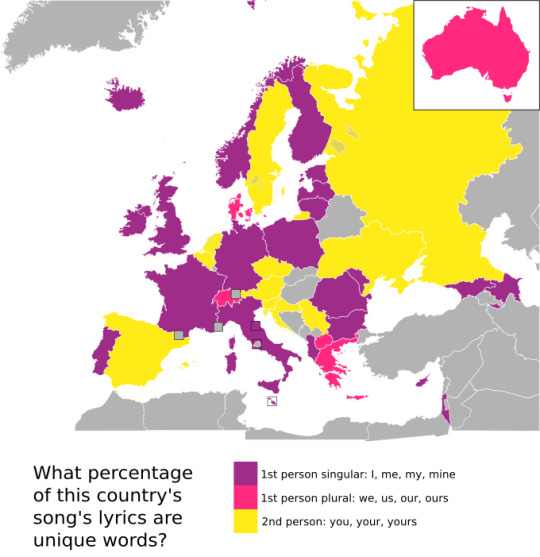
Good morning folks, and welcome to today's statistical map, which is all about this year's lyrics - looking under the bonnet to find the pronoun set most used in each country's texts!
Pronouns can have such an impact on how we experience a song. When the first person predominates (I, me, my, etc), it can be read as more individual or personal, or more egoïstic and exclusive, relating just to the singer and their experiences. Songs where you/your dominates address a speaker directly, but might be sometimes considered confrontational. The rarer 1st personal plural we predominating tries to build a sense of solidarity and community between the singer and listeners.
Typically, the first person singular predominates, but this year, it has a big majority, not just a plurality. 23 of the 39 songs - almost 60% - have I, me, my more than any other pronoun set. This includes all the Baltics, nearly all the Nordics, and all the Big 6 except Spain. Maybe it's the impact of a year of lockdown inspiring even greater than typical introspection.
5 songs have a majority of we, our and us pronouns, and they are scattered around the ESC zone, though it was curious that the neighbours, Macedonia and Greece, both sent songs with this rarer set. Three of these songs (Greece, Switzerland, Denmark) are an exclusive we, referring to the singer with another person who isn't the listener, whilst two are inclusive - Macedonia's song about standing strong and Australia's call for solidarity. The remaining 11 songs have you, your/s as the dominant pronoun set. Of these, most refer to a specific you who is not the listener - but Netherlands, Russia, Slovenia and arguably Sweden buck that trend and could be interpreted as rallying cries to a plural you, a number of potential listeners.
Our most recent winner was a song where the first person singular predominated - but it seems to be something that shifts year on year given that Toy had more you than I, and APD more I than you. We would thus expect this year that a song with more second person pronouns to win - but there aren't many amongst the bookies' favourites. If this trend continues, might we get a surprise win for Russia or Ukraine for instance?
46 notes
·
View notes
Text

Good morning, folks, and welcome to today's Eurovision statistical map, which is something that has fascinated me to track since almost the beginning of this blog a decade ago - how repetitive the songs this year are!
Repetitive sounds like a negative term, but some degree of repetition is pretty much essential in music - bridges and choruses, after all, are repeated and are what people often remember the most about songs. Some songs aren't repetitive enough and are difficult to commit to memory; other songs are too repetitive and end up annoying folk.
Repetitiveness can be measured quite simply, by dividing number of unique words (words not repeated in the lyrics) over entire total of words. This year is the first time since 2017 that the trend of increasingly repetitive songs is reversed: the average song has 38.6% unique words, up 1.9% on 2019 and 3.2% on 2020. This is mostly because of a big drop in the number of songs with 25% or less unique words - there are two in 2021 (Ireland and Romania) but were seven last year. 2021 seems to be a year of levelling out extremes because the number of songs with 52% or higher unique words is just one this year, but was five in 2019.
I feel that this movement to slightly wordier, but not overly so, songs is in part because of a reaction to the last results we have at our disposition. In 2019, the Netherlands and Italy were both less repetitive lyrically than the average - both were in the goldilocks zone around 40% unique words from which so many recent past winners come. This year, we may double down on this, as of the four songs with more than 50% unique words, three (France, Switzerland, Bulgaria) are amongst the bookies' top faves. In the case of any of these winning, I'd expect a 2022 with the highest average unique word count in several years - and for a song that was amongst the most repetitive to win. Eurovision is nothing if not cyclical. A full data table is available below!

63 notes
·
View notes